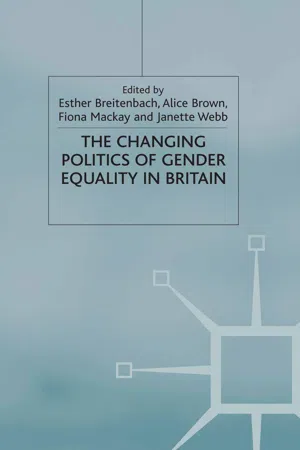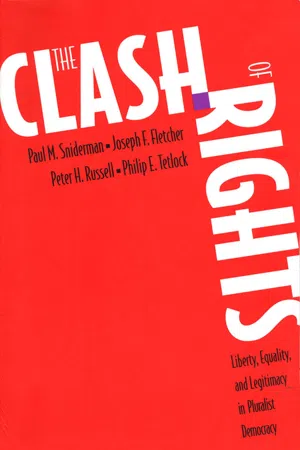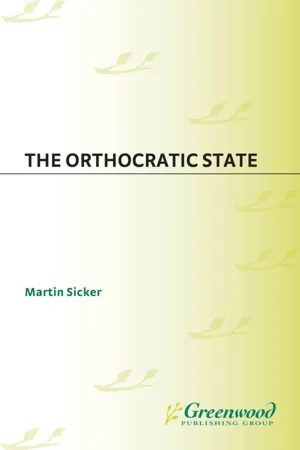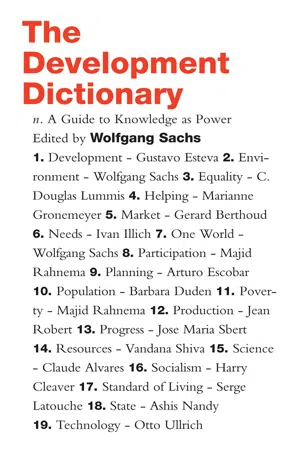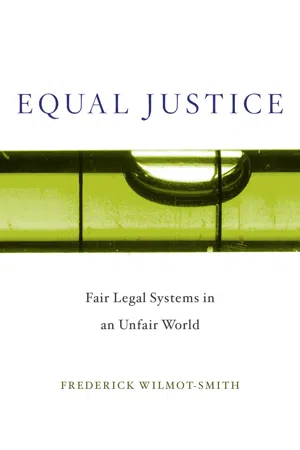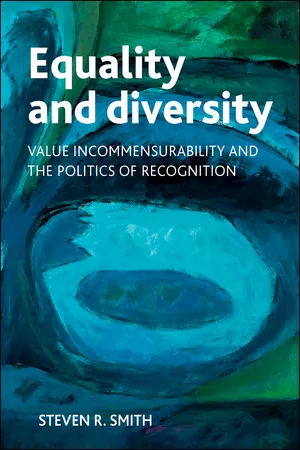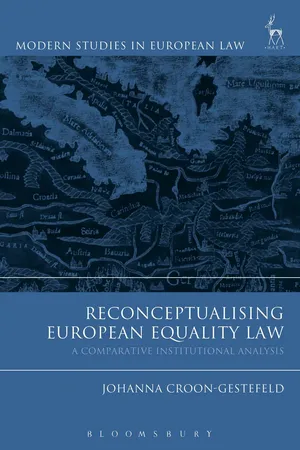Politics & International Relations
Equality
Equality refers to the state of being equal, especially in terms of rights, opportunities, and treatment. It encompasses the fair and just distribution of resources and opportunities among individuals and groups, aiming to eliminate discrimination and promote inclusivity. In the political and international relations context, equality is a fundamental principle that underpins policies and actions aimed at creating a more just and equitable society.
Written by Perlego with AI-assistance
Related key terms
1 of 5
8 Key excerpts on "Equality"
- eBook - PDF
- E. Breitenbach, A. Brown, F. Mackay, J. Webb, E. Breitenbach, A. Brown, F. Mackay, J. Webb(Authors)
- 2016(Publication Date)
- Palgrave Macmillan(Publisher)
These reflect the confluence of the universality of key aspects of the situation of women throughout the world, the political structures and processes that are available to deal with (or ignore) them and the differing approaches to Equality politics itself. For example, a concern with 'rights' appears at a number of levels. These 'rights' may be in respect of individuals, and derive 22 Ian Forbes Table 2.1 The sites of equal opportunities policies Political level International Society The Region The State Government Party Politics Pressure Groups, Social Movements The Civil Sector The Private Sector The Public Realm The Private Realm Organisations United Nations, International non-governmental organisations European Union, North American Free Trade Association Constitution, Law, The justice system Executive, Legislature, Administration, Equality commissions Political parties, The 300 Group Feminist movement, National Organisation of Women Voluntary sector, Non-governmental organisations, Schools Industry and finance Central and local states, Media The family, Relationshi ps Examples of issues International human righ ts, Rape as a war crime Human rights, Refugees, Asylum, Social dumping Equali ty and representa tion Representation, Reproductive choice, Employment Equality Participation, Representation and power Civil rights, Identity, Liberation, Empowerment Social justice, Social exclusion and equal chances Glass ceilings and walls, Child care, Equal pay Personal safety, Pornography, Access Domestic violence, Rape in marriage, Sexuality, Child care from a liberal legal discourse. However, they may equally be framed within a collectivist tradition, and refer to the social and economic rights of groups and peoples rather than individuals. - eBook - PDF
- Maris A. Vinovskis(Author)
- 1996(Publication Date)
- Yale University Press(Publisher)
FIVE THE POLITICS OF Equality Equality occupies a commanding place in contemporary polities for two apparently contradictory reasons: first, it fuels a historic argument over what the government should do on behalf of citizens who have less than others; second, it has thrown up a whole new class of claims to group versus individual rights. Thus Equality has paradoxically come to define central themes both of continuity and change in democratic politics. Equality as a value enters politics at a variety of levels but most conspicu-ously and vitally in the form of disputed proposals for public action. Histori-cally, the clash over Equality has centered on redistributive politics, and this clash, above every other, has served as a gauge of the overall temper of a political culture. Judged in terms of redistributive politics, the center of gravity in Canada is to the left; in the United States, to the right. Yet complex patterns of beliefs about redistributive politics exist. Why does the party in favor of redistribution not always win given that more of the voters would perceive themselves to benefit than lose from redistribution? Partly because of the strains, the competing tendencies of thought, to be found within any political culture. In the Canadian political culture there is an element of resistance to (some forms of) redistributive politics centered on the concept of welfare, a resistance every bit as pronounced north of the Canada-U.S. border as south of it. 120 THE POLITICS OF Equality 121 It would, however, be a mistake to equate the politics of Equality with the politics of redistribution. The reach of the politics of Equality has been trans-formed and, in turn, has transformed the politics of public policy not because the idea of Equality represents a Hegelian historical force inexorably work-ing through its dialectic logic, but because of a pair of related developments, one extrinsic and the other intrinsic to Canadian politics. - eBook - PDF
- Martin Sicker(Author)
- 2003(Publication Date)
- Praeger(Publisher)
"The justice of rendering to each what is his or hers by natural right is the justice that entitles all to political and economic Equality—an Equality in kind that puts all, in the first instance, on the base line of having enough of the political and economic goods that they need in order to live well. The justice of treating equals equally and unequals unequally in proportion to their inEquality is the justice that entitles some of the haves to have more and some to have less in varying degrees." In other words, all enfranchised citizens are essentially equal at the baseline, all sharing equally the minimal degree of political power required for their effective participation in the operation of the state. However, some of these 142 The Orthocratic State same citizens, serving in public office through election or appointment, are in effect above the baseline and have more political power at their disposal, in varying degrees, than the remainder of the citizenry. But, Adler points out: "Those above the base line have more political power legitimately (i.e., by just entitlement) only if they have it because of the power constitution- ally vested in the office they hold. They have it illegitimately if they have it through the undue influence they are able to exercise because of their massive wealth, their social standing in the community, their personal cha- risma, or some other form of privilege or prestige." 56 It is perhaps worth recalling at this point that Montesquieu suggested an alternate notion of what constitutes the baseline of Equality in a demo- cratic society, one that focused on what a person who demands Equality owes to society instead of what society owes to him, a view that all but a few would consider rather quaint in the cynical world of the present. "Love of Equality in a democracy limits ambition to the single desire, the single happiness, of rendering greater services to one's homeland than other citi- zens. - eBook - PDF
The Development Dictionary
A Guide to Knowledge as Power
- Wolfgang Sachs(Author)
- 2009(Publication Date)
- Zed Books(Publisher)
To accept Equality of opportunity is to accept the game, and to accept the game is to accept the identity of player. In this way, Equality of opportunity incorporates some elements from the traditional meanings of Equality and eliminates others, producing a remarkable paradox, a system which generates homogeneity and economic inEquality, and pronounces the consequence just. THE POLITICS OF CATCHING UP We may now turn to the question of the form Equality has taken in the context of the post-war ideology of world economic development. This may be divided into two parts: the Equality that economic development promises and the Equality it actually produces. What it promises is equal justice (which it defines as economic Equality) and what it produces is homogeneity (while maintaining and intensifying economic inEquality). How does this happen? The essence of economic development Equality is contained in the phrase ‘catching up’ or ‘narrowing the gap’. For example, in the Declaration on the Establishment of a New International Economic Order, adopted by the United Nations on / May /752 , it was announced that the NIEO shall correct inequalities and redress existing injustices, making it possible to eliminate the widening gap between the developed and the developing countries and ensure steadily accelerating economic development. 10 The idea that a difference in wealth between countries could be described as inEquality, in the sense of injustice, would have been unintelligible a few hundred years ago. The accusation of injustice cannot traditionally be made against inequalities between systems, but only within a system. The fact that the idea is intelligible today is evidence of the degree to which we accept that the world has been organized into a single economic system. - eBook - PDF
- Harold Bolitho(Author)
- 1998(Publication Date)
- Yale University Press(Publisher)
Equality Since ancient times Equality has been considered a distinguishing characteristic of justice. Aristotle, whose teaching on this point can be regarded as the classic exposition of the question, says that justice in the proper sense is Equality—that is, the mean between superfluity and the insufficiency; the latter two principles correspond to injus-tice. 1 But because Equality may be of two types, numerical and pro-portional, the one being an arithmetic principle and the other a principle of geometrical proportion, so justice is divided into two forms, which Aristotle calls commutative and distributive. The first type applies to obligations imposed by commercial transactions as well as those resulting from violations of the law. In transactions things of equal value are exchanged, one for one; in the case of criminal acts, the harm done to one person is rectified by the penalty exacted from the other. Distributive justice is a rule governing the distribution of public goods like property, honor, authority, in accordance with services rendered or with the merit of each member of society. Thus the concept of justice encompasses four terms: two individuals and two objects, and the equivalence between objects should correspond to the 380 Equality 381 equivalence between the individuals. From this it follows that equal distribu-tion of objects is just only when the objects are distributed to equal individuals; an equal distribution of objects to unequal individuals is unjust. Moreover, it is apparent that an unequal distribution of objects may be just, if the unequal treatment is accorded to unequal individuals. Aristotle says that those who ignore this precept judge speciously, mainly because they are judging their own situation. The same can be said of political parties, each of which defends a certain aspect of justice but remains silent about its most essential one. - eBook - PDF
Equal Justice
Fair Legal Systems in an Unfair World
- Frederick Wilmot-Smith(Author)
- 2019(Publication Date)
- Harvard University Press(Publisher)
A democratic community may not require Equality in all dimensions— democracies can, for example, tolerate some income and wealth inequalities— but it cannot countenance inEquality of justice. Any theory of a democratic state will have to prescribe various rights to participation. These might reduce to a right to hold public office and to vote; they might also include a wider range of rights, such as those to freedom of speech, necessary to guarantee the democratic process. 29 The democratic urge of isonomia is found, more generally, in arguments that certain rights must be held equally. Rawls’s first principle of justice, lexically prior to the second, holds that everyone should have “the most extensive total system of equal basic liberties compatible with a similar system of liberty for all.” 30 Very many political theories accept a principle like this, though they may disagree about the nature of those liberties or what it means for them to be equal. Whatever these fundamental liberties are, they should not be traded off for greater welfare. It is not morally permissible to strip an in-dividual of their rights to physical security simply because doing so in-creases the country’s gross domestic product. The principle of equal rights is highly intuitive and widely recognised as a goal. 31 But it is not enough that rights be equal; they must be equally en-forced. Power and outcomes matter. A justice system aims to ensure that E Q U A L J U S T I C E 35 law, not power, controls outcomes. If there is no equal justice, those with more power can distort the law (even a law with equal rights) in their fa-vour. The commitment to equal rights can thus be used, with one extra step in reasoning, to underline the importance of equal justice. This connection is sometimes missed because of a common distinction in political theory between the liberty to do something and the power to exercise that liberty. - eBook - PDF
Equality and diversity
Value incommensurability and the politics of recognition
- Steven Smith(Author)
- 2011(Publication Date)
- Policy Press(Publisher)
The point is that the value of Equality is also readily endorsed, given that these rights are equally attributable to all. However, egalitarian positions have been complicated, not only by disputes among liberals and egalitarians, but also by the rise of what has been dubbed the ‘politics of recognition’. Born from Equality movements, but based on a radicalised assertion of specifc or particularised identities, this new politics emphasising diferences between people has profoundly disrupted traditional egalitarian agendas (for example, see Young, 1990; Honneth, 1992; 2007; Taylor, 1992; Fraser, 1997; Parekh, 2000; Fraser and Honneth, 2003). However Equality is conceptualised, universal liberal claims that all persons are equal and should be ascribed certain rights, while not necessarily entirely rejected, are now often viewed with suspicion, judged as ignoring, or at least underestimating, the normative signifcance of being diferent (that is, diferences that relate to group membership and/or personal characteristics that are said to comprise specifc identities and matter deeply to particular persons). 2 For example, elements of feminist theory, being traditionally concerned with establishing Equality between men and women, have recently been highly critical of these liberal and egalitarian assertions. Often informed by postmodern and poststructuralist theory from continental Europe, the argument roughly states that the value of Equality, while represented as a liberating and universal goal for all, merely serves to justify dominant masculanised cultural norms exercised through these liberal justifcations, denying gender diference and so excluding and suppressing interests particular to women (for example, see Butler, 1990; Young, 1990; Whelehan, 1995; Squires, 1999; Bryson, 2003). - eBook - PDF
Reconceptualising European Equality Law
A Comparative Institutional Analysis
- Johanna Croon-Gestefeld(Author)
- 2017(Publication Date)
- Hart Publishing(Publisher)
5 For this reason, Krebs describes this phraseology of Equality terminology as its intrinsic or strict usage. A Krebs, ‘Gleichheit oder Gerechtigkeit. Die Kritik am Egalitarismus’ in C Nimtz (ed), GAP Proceedings 4 (Paderborn, Mentis, 2001) 563, 565. 6 eg N Smith, ‘Why Do We Speak Of Equality?’ (2005) 11 Otago Law Review 53, 62 (‘Equality is a relational concept’). The chapter’s central claim is that Equality, as one value among others, matters. Equality is an important concept, as it brings the relational side of fundamental rights to the fore. It enables us to evaluate an individual’s demand for respect and just treatment in comparison to that of other members of society. In order to develop this point, the following chapter is structured as follows: as a first step, the general discourse on Equality will be introduced. That is to say, the topic will be presented as dealt with in political philosophy. In a second step, the examination will be narrowed down to a discussion on the reasons for the principle of Equality as a legal concept. The last part of the chapter is dedicated to an examination of a question that appears repeatedly in egalitarian discourse: the question on the relationship between Equality and non-discrimination. I will argue that in the context of European law these two terms can be understood as interchangeable notions reflecting the same egalitarian principle. A. Reasons for Having the Concept of Equality i. Interpersonal Explanations So why Equality? In order to approach the topic, one may well start with the cake example. 4 A mother has baked a cake and distributes two of its pieces among her children, Phil and Joe. Both sons receive slices big enough to satisfy their hunger and desire for cake, but Phil gets a much bigger slice than his brother.
Index pages curate the most relevant extracts from our library of academic textbooks. They’ve been created using an in-house natural language model (NLM), each adding context and meaning to key research topics.
